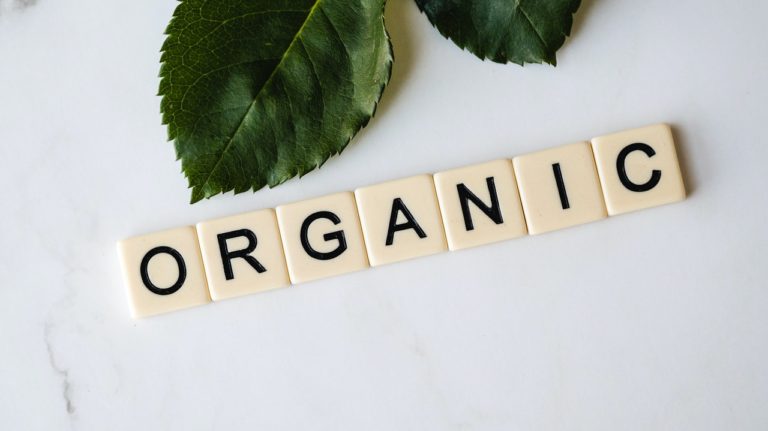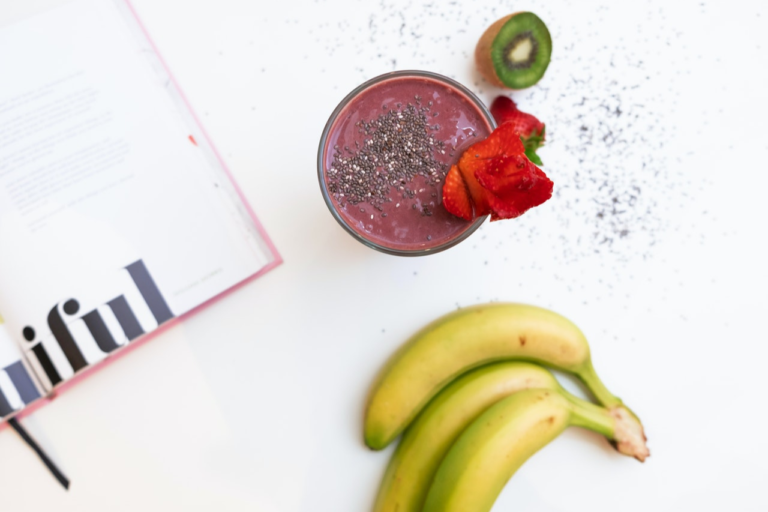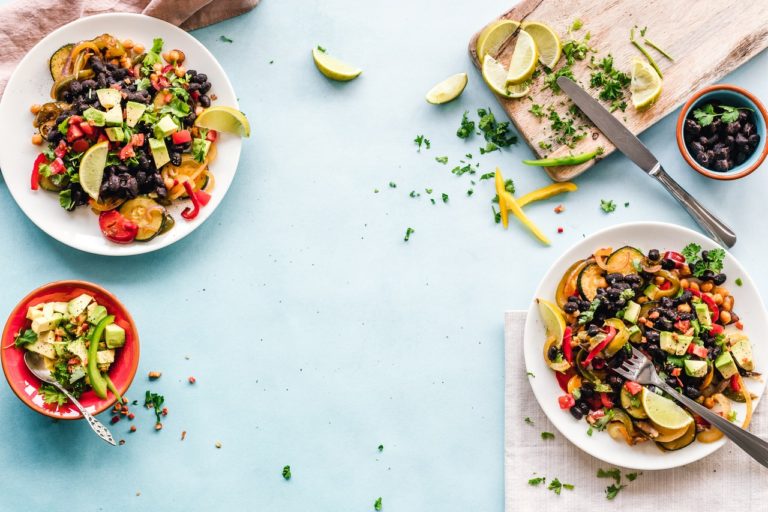18 Things I Learned from a 30-Day No Sugar Challenge
Ah, sugar. I have a love-hate relationship with this sneaky little ingredient. It tastes SO good, yet I feel terrible after I eat it (after the initial high and taste bud explosion, of course). And I know that it contributes to some general constitutional symptoms I experience, like mood swings (related to my hunger), bloating, low energy, and more.
Since the average American eats over 17 teaspoons of added sugar a day (WAY above the recommended 6 teaspoons), I know I’m not the only one who has a bad relationship with sugar.
That’s why I decided to do a 30-day no-sugar challenge. I’ve done a no-sugar challenge a few times in the past for Lent or when I told myself, “Enough is enough.” Sometimes, I was successful, and other times, I failed miserably. Regardless of my success, I always learned a lot about myself.
1. I have NO self-control when it comes to refined sugar

Baked goods, candy, or anything purposely made to be sweet- I literally cannot have just one unless someone hides all the goodies after I have one.
But, from research, I’ve learned this isn’t my fault! We are genetically designed to seek out and enjoy sweet stuff because it’s dense with energy (even though it’s nutrient-void). It’s also highly addictive, causing our brains to release dopamine (the feel-good hormone) when we consume it. This explains why we crave sugar and have a hard time controlling ourselves around it.
2. I often swap sweets for other junk

Often, I replace my cravings for sweets when I do a challenge with some other junk. For example, instead of reaching for candy or a baked good, my go-to’s become bread and potato chips. This is because refined carbohydrates, like white bread and chips, are broken down into simple sugars in our body and can have similar effects on our blood sugar levels and cravings as straight-up sugar.
So, even if I’m not eating traditional sweets, I still consume a lot of added sugar in other forms if I’m not mindful.
3. My mood is directly tied to my sugar intake

During the first week of my no-sugar challenge, I experienced some major low energy and mood swings. This was because my body was used to getting quick bursts of energy from refined sugar but now had to rely on slower-releasing complex carbohydrates for fuel.
However, as the weeks went on, I noticed a significant improvement in my energy levels and mood. I no longer experienced the afternoon crash or irritability that often followed consuming sugar. This was a huge eye-opener and made me realize just how much sugar was affecting my overall well-being.
4. Sugar is added to almost everything

When I started reading labels and being more mindful of my sugar intake, I was shocked to see how many products contained added sugar. From salad dressings to pasta sauces to even some types of bread, sugar lurked in almost every packaged food.
This made me realize the importance of cooking and preparing my own meals with whole, unprocessed ingredients as much as possible. It’s a great way to control the amount of added sugar I consume and to avoid any hidden sources.
5. My taste buds changed

In the beginning, I craved sugar like crazy. But as the weeks went on, I craved it less and less. And when I did have something sweet, it tasted almost too sweet for me.
This showed me that our taste buds are adaptable and can be trained to enjoy less sugar. It also made me realize that I don’t need as much added sugar in my diet and can opt for healthier, natural options like fruit instead.
6. Planning is key

During this no-sugar challenge, one of the biggest challenges was being prepared when going out or attending events. It’s easy to succumb to temptation when you’re hungry, and there’s nothing else to eat.
So, I learned the importance of planning ahead and always having healthy, sugar-free snacks on hand. This helped me avoid giving in to my cravings and stay on track with my challenge.
7. Certain “sweets” were less addictive for me

At the end of my 30-day challenge, I didn’t want to fall back into my sugar-crazy habits. Through trial and error, I discovered that there are certain “sweet” foods that I can have just one (or two) of because they lack the overwhelming over-sweet stimulus.
For example, I have less problem with dark chocolate than with sweeter milk chocolate candy bars. Items with more “natural” sweets (slightly less refined), such as coconut sugar, dates, applesauce, and fruit, were also less addictive for me. This discovery helped me find healthier alternatives to traditional sweets that still satisfied my cravings without causing me to overindulge.
8. Avoiding sugar at night improved my sleep

I used to have a bad habit of indulging in something sweet after dinner. But during the no-sugar challenge, I consciously tried to cut out nighttime sweets. Surprisingly, I noticed a significant improvement in my sleep.
Without the sugar-induced energy spike and crash, I could fall asleep more easily and wake up feeling refreshed in the morning. I also didn’t wake up in the middle of the night or early morning feeling starving, which I used to experience when consuming sugar before bed.
9. My daily bloating reduced significantly

Bloating is a common side effect of consuming too much sugar and other junk that the body has a hard time processing. And during my no-sugar challenge, I noticed a significant reduction in bloating and stomach discomfort.
I used to experience the worst bloating at the end of the day, but as I cut out added sugar, my belly was significantly flatter and less uncomfortable. This also helped reduce the onset of embarrassing gas or stomach noises after eating sugary foods.
This was because without the added sugars, my body didn’t produce as much gas from digesting them. This made me feel less sluggish and more comfortable throughout the day, which was a major motivator for me to continue reducing my sugar intake even after the challenge ended.
11. Too much sugar is a vicious cycle

Before my no-sugar challenge, I would often experience a cycle of craving and indulging in sugar. The more I consumed, the more I craved it. And the harder it was to break the cycle.
But during my challenge, I broke that cycle and learned that consuming too much sugar can be a never-ending vicious cycle if you let it. Breaking free from this cycle has been one of the greatest benefits for me and has helped me maintain a healthier relationship with sugar.
12. My skin cleared up

I’ve always struggled with breakouts, but during my no-sugar challenge, I noticed a significant improvement in my skin. Sugar can cause inflammation in the body, manifesting as acne on the skin.
Cutting out added sugars and focusing on whole, unprocessed foods made my skin clearer and more radiant. This was an unexpected benefit of reducing my sugar intake, but one that I am extremely happy about.
13. My energy levels skyrocketed

I have pretty demanding days between work, kids, and other responsibilities. And before my no-sugar challenge, I often felt drained and exhausted by mid-afternoon.
But after reducing my sugar intake, I noticed a dramatic increase in my energy levels throughout the day. I could power through without needing any sugary snacks for an energy boost. This was a game-changer for me and has helped me become more productive and focused.
14. Moderation is key

My no-sugar challenge taught me that it’s all about moderation and balance regarding sugar (and really any type of food). Cutting out all added sugars completely may not be sustainable or realistic for everyone, but being mindful and limiting your intake can greatly impact your overall health and well-being.
So instead of completely eliminating sugar, I’ve learned to enjoy it in moderation and make healthier choices when possible. That’s what works best for me in the long run.
15. The true game changer was my mindset shift

I used to view challenges like a “No Sugar Challenge” as a restriction that I had to endure to force myself to be healthier. But this time around, I approached it with a new mindset—one of self-care and self-love.
Instead of depriving myself of something, I saw it as improving my overall health and well-being. This shift in mindset made the challenge more enjoyable and sustainable for me. It made it possible for me to easily say “no” to someone’s offer of a sweet when, in the past, I wouldn’t have felt so guilt-ridden and sad to have missed out on an opportunity to indulge. It has also motivated me to make healthier choices, even after the challenge ended.
16. I had to change some internal dialogue

Along with a mindset shift, I realized I’d acquired some limiting beliefs in my lifetime that were affecting my relationship with sugar.
For example, I stopped worrying about offending others when I declined a treat they offered. I stopped comparing myself to others and their eating habits. I stopped trying to “exercise” away my bad eating habits.
17. An accountability partner helped immensely

Fortunately, a friend who wanted to reduce her sugar intake joined me on this challenge. We were each other’s accountability partners and moral support when the cravings got tough.
Having someone to talk to about our progress, share recipes and tips, and motivate each other made all the difference in successfully completing the challenge. It also strengthened our friendship and helped us create healthier eating habits in the long run.
18. Overall, my relationship with food has improved

My no sugar challenge wasn’t just about cutting out added sugars, it was also about becoming more mindful of what I put into my body and learning to make healthier choices.
This awareness and mindfulness have helped me form a better overall relationship with food. Instead of seeing food as a reward or comfort, I see it as fuel for my body and prioritize nourishing myself with healthy options. This has had a positive impact on my physical and mental well-being.
27 Ways Real People Were Able to Lose Weight Sustainably without Extreme Dieting

Finding it challenging to lose those stubborn extra pounds, and growing more disheartened by the digits on your scale? The plethora of diets, exercise routines, and conflicting guidance can, without a doubt, feel quite bewildering. In the midst of numerous choices and contradictory information, you might naturally ponder: Where should you even commence?
27 Ways Real People Were Able to Lose Weight Sustainably without Extreme Dieting
15 Delicious and Light Snacks for When You Want to Munch

We’ve all encountered that common conundrum: the search for a delightful snack that satisfies our palate without burdening us with an overload of unwanted calories
15 Delicious and Light Snacks for When You Want to Munch







